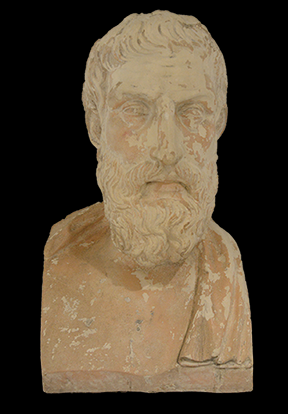Bust of Epicurus

Artist: Unknown
Date: About 270 B.C.
Location: Library, Second Floor
The original of this bust of Epicurus was found in the Villa Casali, Rome, and is now in the British Museum in London. In all probability, this bust is a Roman copy of a Greek original. The adjective "epicurean" is taken today to mean "having luxurious tastes or habits, especially of eating and drinking." In his day, however, the great Greek philosopher was notable for his exposition of the atomistic theory of physics and for ethical teachings that entitled him to be respected as a great moral reformer.
In Epicurus' ethical system, the criterion of good and evil is sensation; so that "we declare pleasure to be the beginning and the end of the blessed life; for we recognize this to be our first and natural good, and from this we start in every choice and avoidance; and this we make our goal, using feeling as the canon by which we judge every good." Moreover, "It is not possible to live pleasantly without living wisely and well and righteously." Consequently, Epicureanism is not as hedonistic as it at first sounds.
A significant portion of Epicurus' labors was spent on the formulation of an atomic theory. He further hypothesized that the atoms are not all of one shape. Atoms vary in size but are not of all sizes; otherwise, some would be visible.
Descriptive and historical information about the sculptures compiled by Dr. Douglas O. Eason.







